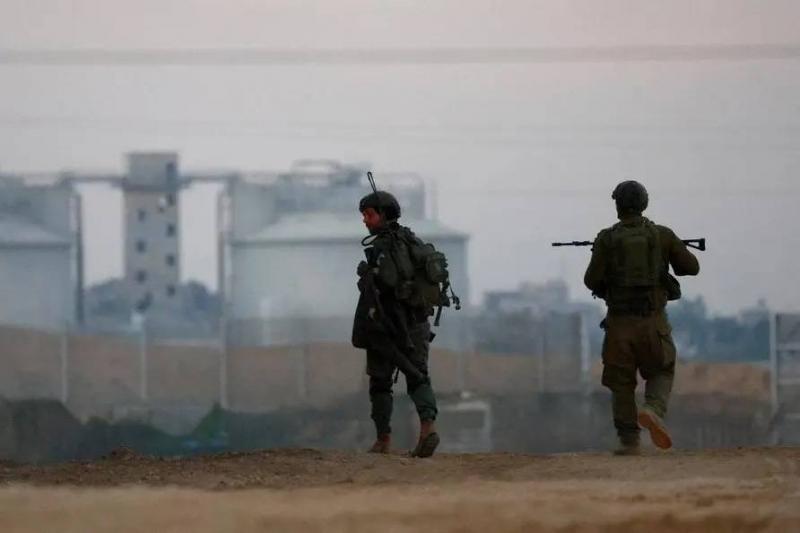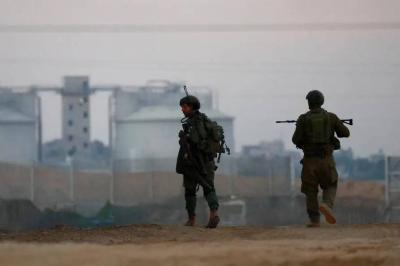Six sources directly familiar with the information told Reuters that "Israel is carrying out an unprecedented wave of deadly strikes in Syria targeting cargo trucks, infrastructure, and individuals involved in transferring Iranian weapons to allied groups in the region." The sources, including a Syrian military intelligence official and a leader in the regional coalition supporting the Syrian government, stated that Israel changed its strategies following the attack by militants from the Palestinian Islamic Resistance Movement (Hamas) on Israel on October 7, and the subsequent Israeli bombings in Gaza and Lebanon.
The sources explained that while "Israel has targeted Iran-linked objectives in Syria for years, including areas where the Lebanese armed group Hezbollah operates, it is now conducting deadlier and more frequent air raids targeting Iranian weapons transfers and air defense systems in Syria."
A leader in the regional coalition and two other sources familiar with Hezbollah's thinking noted that "Israel has abandoned the previous 'rules of the game' based on secrecy for its strikes in Syria and seems to be 'less cautious' about inflicting heavy losses on Hezbollah there." The leader explained, "They used to fire warning shots; they would strike near the truck, our men would exit the truck, and then they would hit the truck," describing the Israeli attacks on Hezbollah's weapons transfers before October 7. He added, "That’s over. Israel is now conducting more lethal and more frequent air raids on Iranian weapons transfers and air defense systems in Syria. They are bombing everyone directly. They are bombarding to kill."
The intensified air campaign has resulted in the deaths of 19 Hezbollah members in Syria over the past three months, more than double the number in all of 2023 prior to October 7, according to a Reuters survey. Additionally, over 130 Hezbollah militants were killed due to Israeli bombing in southern Lebanon during the same period. The Israeli military did not respond to Reuters' inquiries regarding the escalation of its operations. A senior Israeli official told reporters, speaking on condition of anonymity, that "Hezbollah initiated this round of fighting with attacks on October 8, and the Israeli strategy was retaliatory."
In response to a question last month about an Israeli raid in Syria, the Israeli army chief stated that the forces operate throughout the region and take "all necessary measures" to demonstrate Israel's insistence on defending itself.
### Iranian Forces
For years, Israel has targeted Iran-linked goals in Syria, but sources familiar with the strikes indicated that it appeared to avoid killing Hezbollah members as much as possible. A regional intelligence officer remarked, "Israel fears that an increase in casualties could trigger Hezbollah's desire in Lebanon to retaliate against nearby Israeli villages." He added that as mutual exchanges of fire between the two sides continue daily after the October 7 attack, Israel intends to be "less cautious and restrained" in killing Lebanese Hezbollah members in Syria.
Hezbollah's Secretary-General Hassan Nasrallah stated in a televised speech on January 5 that the group has lost several fighters due to Israeli bombing in Syria in several locations over the past three months. He added that "the group had been following an approach before the Al-Aqsa Flood operation to respond to the killing of any of its members in Syria across the Lebanese border, which was quiet at that time. However, due to current developments, the terms of this approach have changed."
A commander in the pro-Syrian coalition pointed out that an Israeli drone strike on December 8 killed three Hezbollah fighters who were planning potential operations in northern Israel, while another strike targeted the city of Quneitra in southern Syria, killing two Hezbollah fighters responsible for weapon transfers. Additionally, four others were killed in late December due to a strike on buildings and trucks used by Iran-aligned armed groups along the eastern Syrian border with Iraq.
The strikes also targeted the Iranian Revolutionary Guard in Syria. A strike in early December resulted in the deaths of two Guard members, and another strike on December 25 killed a senior advisor in the Guard overseeing military coordination between Syria and Iran. A source familiar with Hezbollah's thinking and operations in Syria remarked, "He would not have been killed before the new reality entered into force after October 7."
### Threat to Assad
Separate airstrikes targeted military infrastructure in southern Syria, including an air defense base on December 28, after another strike hit a defense system. A Syrian intelligence officer stated, "The strikes hit defensive equipment before the forces could bring it into service. Airports in the Syrian capital Damascus and northern Aleppo, which Iran uses for weapons transfers, have been rendered largely inoperable due to the strikes." He added, "Israel is telling President Bashar Assad, 'You allow the Iranians and Hezbollah to transfer weapons and bolster their capabilities, so we will strike the airports that represent a lifeline for you, and you will find yourselves in a predicament.'"
Israel has repeatedly affirmed that it does not seek to open a second front in the war in Lebanon or Syria. Despite the intensification of Israeli strikes, the Syrian army, which has heavily relied on Hezbollah and Iran in the civil war, has not opened a front of its own. A Syrian intelligence officer commented, "We do not want to put ourselves in confrontation or an open war with Israel."
Three sources familiar with the information told Reuters that "Assad has not taken any action to support Hamas following Israeli threats." Two of the sources indicated that "the UAE relayed the retaliatory threats from Israel," while an Emirati official denied this, stating that "there is no basis for the rumors." The third source noted that the message resonated with "Hezbollah." He added: "Hezbollah took the threat seriously because it would cost them everything they built in Syria over the past years."




